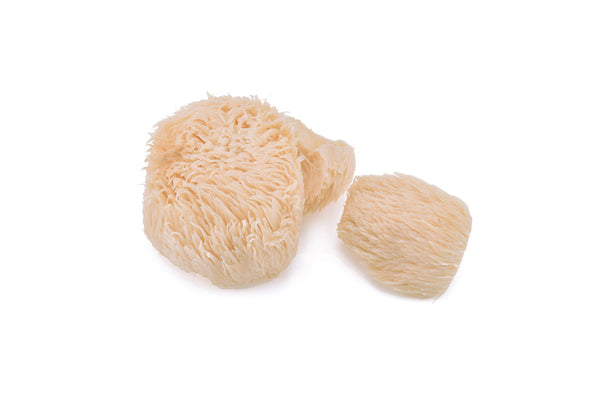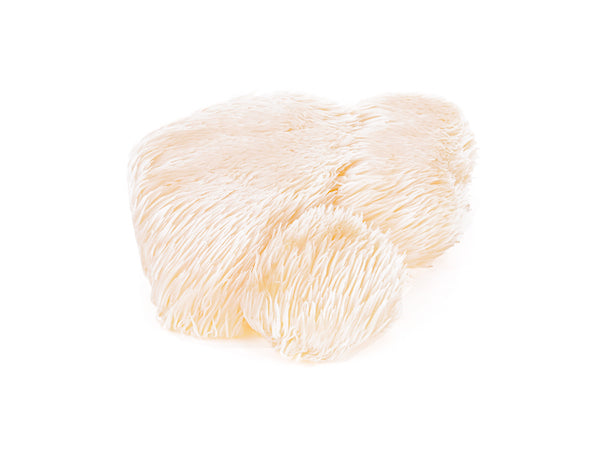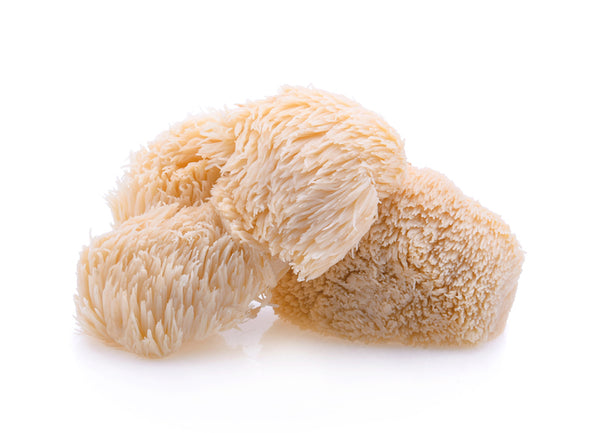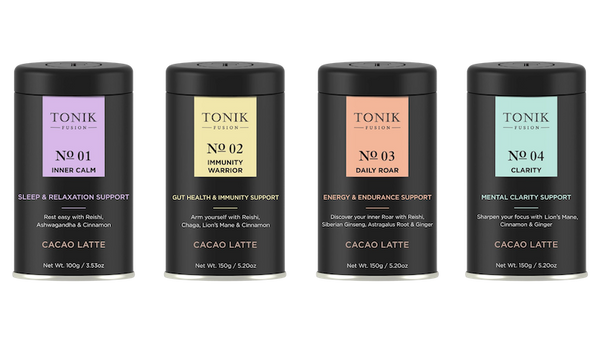Is Lion's Mane Beneficial for Osteoporosis?
After adding Lion's Mane to my daily health regimen, I quickly noticed a range of personal health benefits, which inspired me to create Tonik Fusion's unique adaptogenic mushroom blends. This led me to ponder the potential of Lion's Mane for supporting bone health, especially in the context of osteoporosis in the elderly.
Given the significant improvements I witnessed in myself, it seemed plausible that this remarkable mushroom could offer similar benefits for enhancing the well-being and bone strength of older adults.
Recent studies suggest that Lion's Mane mushroom could have a positive effect on bone health, potentially aiding in the prevention and treatment of osteoporosis. Its bioactive compounds have been shown to support bone density and metabolism, making it a promising natural remedy for those looking to strengthen their bones and improve overall skeletal health.
What is Lion's Mane?

Lion's Mane, or Hericium erinaceus, is more than just a culinary delight; it's a medicinal mushroom with a rich history in traditional Chinese medicine. Renowned for its potential neuroprotective properties, Lion's Mane also contains an array of bioactive compounds that could be beneficial for bone health.
These compounds, including hericenones and erinacines, may stimulate nerve growth factor (NGF) synthesis, which could play a role in bone density and health.
What is Osteoporosis?
Osteoporosis, often dubbed the "silent disease," insidiously weakens bones, making its presence known typically through unexpected fractures from minor incidents. The disease renders bones brittle and more susceptible to fractures, even under the slightest stress, conditions that wouldn't normally cause damage to healthy bones.
The risk of developing osteoporosis escalates with factors such as aging, hormonal changes particularly post-menopause in women, inadequate calcium and vitamin D levels, and a sedentary lifestyle.
Predominantly affecting older adults, especially postmenopausal women due to the sharp decline in estrogen levels, osteoporosis can also impact men and younger populations under certain conditions. Understanding and addressing these risk factors is crucial for the prevention and management of osteoporosis, highlighting the necessity of active engagement in bone health maintenance from an early age.
Recognizing the Early Signs of Osteoporosis
Osteoporosis often begins quietly, without clear warning signs, but early indicators can manifest subtly through changes in physical appearance and sensations of discomfort. Key early signs to watch for include:
- Stooped Posture: An initial, subtle curvature of the spine that may evolve into a more pronounced stoop, often a result of weakening vertebrae.
- Back Pain: Chronic or intermittent back pain without an obvious cause could signal the onset of osteoporosis, possibly due to weakening bones or unnoticed fractures.
- Decrease in Height: A slight, gradual decrease in overall height can be an early warning sign, often due to the compression of vertebrae in the spine.
- Frequent Minor Fractures: Experiencing fractures from minor stresses or falls that wouldn't normally cause such injuries can be an early clue to decreased bone density.
- Brittle Nails: While not as definitive as other signs, an increase in nail brittleness can sometimes accompany bone density loss.
Can Lion's Mane Prevent Osteoporosis?

Lion's Mane mushroom is gaining attention for its potential role in enhancing bone health, particularly as a natural strategy against osteoporosis, a condition more prevalent in the elderly.
Preliminary research suggests that the mushroom could promote bone formation and slow the progression of bone density loss, crucial in combating osteoporosis. Specifically for the elderly, who are at a heightened risk for this condition due to factors like hormonal changes and decreased physical activity, Lion's Mane could offer significant benefits:
- Bioactive Compounds: The mushroom's compounds, known for their anti-inflammatory and antioxidant effects, might improve bone health by reducing inflammation and oxidative stress, two factors that can exacerbate bone density loss in older adults.
- Bone Formation: Preliminary studies suggest that Lion's Mane may stimulate the body's bone-building cells, offering a natural boost to the bone regeneration process, which tends to slow down with age.
- Osteoporosis Management in the Elderly: Considering its potential to mitigate bone density reduction, Lion's Mane could serve as a valuable component of a comprehensive osteoporosis management plan for the elderly, alongside other treatments and lifestyle modifications. This necessitates more targeted research to ascertain its effectiveness and the mechanisms at play, especially in aging populations.
How Does Lion's Mane Influence Bone Density?
Bone density, the measurement of mineral content in bones, is a crucial indicator of bone strength and overall skeletal health. As for Lion's Mane's impact on bone density, the mechanisms remain complex and not fully understood. However, it's theorized that its effect on the production of nerve growth factor (NGF) could be significant.
NGF, while primarily associated with nerve development, is also believed to affect osteoblasts and osteoclasts, the cells responsible for bone formation and resorption, respectively. By potentially influencing these cells, Lion's Mane may play a role in enhancing bone metabolism and density, indicating its potential as a supportive element in bone health beyond its recognized benefits for neurological well-being.
How Does Lion’s Mane Mushroom Support Bone Regeneration?

Lion's Mane mushroom is thought to facilitate bone regeneration primarily by activating osteoblasts, the cells responsible for new bone formation, through its unique bioactive compounds. These compounds might modulate cellular signaling pathways that are crucial for bone growth and the repair of bone tissue, enhancing overall bone health and integrity.
Moreover, the mushroom's inherent anti-inflammatory properties could further aid in reducing inflammation around bone tissue, promoting a more conducive environment for bone regeneration and maintaining bone density.
How Should You Use Lion's Mane for Bone Health?
For enhancing bone health with Lion's Mane, incorporating it into your daily routine can be both simple and enjoyable. Opting for our cacao latte blends, like the Immunity Warrior or Clarity Cacao Latte, provides a delightful and healthful way to enjoy the benefits of Lion's Mane.

These blends not only offer the potential bone health benefits of Lion's Mane but also combine other adaptogens and herbs, supporting overall wellness in a delicious, holistic approach. Check out our shop.
FAQs about Osteoporosis and Lion’s Mane
Can dietary changes improve bone health in osteoporosis patients?
Yes, dietary changes, such as increasing intake of calcium and vitamin D-rich foods, can significantly improve bone health in osteoporosis patients.
What is the best age to start osteoporosis prevention?
Building peak bone mass through calcium-rich diets and weight-bearing exercise should begin in young adulthood, ideally before the age of 30, as bones are most receptive to growth during this period. However, adopting bone-healthy practices is beneficial at any age to preserve bone density and prevent osteoporosis.
How often should bone density be checked for osteoporosis?
Bone density should be checked every 1-2 years if you are at risk for osteoporosis, as recommended by a healthcare provider.
Can Lion's Mane interact with osteoporosis medications?
While definitive research on the interactions between Lion's Mane and osteoporosis medications is scarce, potential interactions cannot be ruled out due to the mushroom's bioactive compounds. Therefore, consulting with a healthcare provider is crucial before adding Lion's Mane to your regimen if you're on osteoporosis medication.
What lifestyle factors can negatively affect bone density?
Lifestyle factors that can negatively affect bone density include smoking, excessive alcohol consumption, a sedentary lifestyle, and a diet low in calcium and vitamin D.
Is weight-bearing exercise beneficial for all osteoporosis patients?
Weight-bearing exercise is generally beneficial for osteoporosis patients, but it should be tailored to individual abilities and conditions to avoid the risk of fractures.
Closing Thoughts
As we delve deeper into the potential health benefits of adaptogenic mushrooms like Lion's Mane, it's important to remember that no single food or supplement is a cure-all. A balanced diet, regular exercise, and a healthy lifestyle are paramount for bone health and overall well-being.
For those interested in exploring the benefits of Lion's Mane and other adaptogens, I invite you to visit our store and take our quiz to find the cacao blend that best suits your goals and lifestyle.